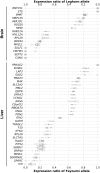RNA-Seq Analyses Identify Frequent Allele Specific Expression and No Evidence of Genomic Imprinting in Specific Embryonic Tissues of Chicken
- PMID: 28931927
- PMCID: PMC5607270
- DOI: 10.1038/s41598-017-12179-9
RNA-Seq Analyses Identify Frequent Allele Specific Expression and No Evidence of Genomic Imprinting in Specific Embryonic Tissues of Chicken
Abstract
Epigenetic and genetic cis-regulatory elements in diploid organisms may cause allele specific expression (ASE) - unequal expression of the two chromosomal gene copies. Genomic imprinting is an intriguing type of ASE in which some genes are expressed monoallelically from either the paternal allele or maternal allele as a result of epigenetic modifications. Imprinted genes have been identified in several animal species and are frequently associated with embryonic development and growth. Whether genomic imprinting exists in chickens remains debatable, as previous studies have reported conflicting evidence. Albeit no genomic imprinting has been reported in the chicken embryo as a whole, we interrogated the existence or absence of genomic imprinting in the 12-day-old chicken embryonic brain and liver by examining ASE in F1 reciprocal crosses of two highly inbred chicken lines (Fayoumi and Leghorn). We identified 5197 and 4638 ASE SNPs, corresponding to 18.3% and 17.3% of the genes with a detectable expression in the embryonic brain and liver, respectively. There was no evidence detected of genomic imprinting in 12-day-old embryonic brain and liver. While ruling out the possibility of imprinted Z-chromosome inactivation, our results indicated that Z-linked gene expression is partially compensated between sexes in chickens.
Conflict of interest statement
The authors declare that they have no competing interests.
Figures




Similar articles
-
Transcriptome-wide investigation of genomic imprinting in chicken.Nucleic Acids Res. 2014 Apr;42(6):3768-82. doi: 10.1093/nar/gkt1390. Epub 2014 Jan 21. Nucleic Acids Res. 2014. PMID: 24452801 Free PMC article.
-
Genomic organization and allelic expression of UBE3A in chicken.Gene. 2006 Nov 15;383:93-8. doi: 10.1016/j.gene.2006.07.019. Epub 2006 Jul 31. Gene. 2006. PMID: 16996702
-
Allele-specific RNA-seq expression profiling of imprinted genes in mouse isogenic pluripotent states.Epigenetics Chromatin. 2019 Feb 15;12(1):14. doi: 10.1186/s13072-019-0259-8. Epigenetics Chromatin. 2019. PMID: 30767785 Free PMC article.
-
Epigenetic modification and imprinting of the mammalian genome during development.Curr Top Dev Biol. 1999;43:1-49. doi: 10.1016/s0070-2153(08)60377-4. Curr Top Dev Biol. 1999. PMID: 9891882 Review.
-
Using next-generation RNA sequencing to identify imprinted genes.Heredity (Edinb). 2014 Aug;113(2):156-66. doi: 10.1038/hdy.2014.18. Epub 2014 Mar 12. Heredity (Edinb). 2014. PMID: 24619182 Free PMC article. Review.
Cited by
-
Reinforcement of repressive marks in the chicken primordial germ cell epigenetic signature: divergence from basal state resetting in mammals.Epigenetics Chromatin. 2024 Apr 26;17(1):11. doi: 10.1186/s13072-024-00537-7. Epigenetics Chromatin. 2024. PMID: 38671530 Free PMC article.
-
Mini review: Studying epigenomic alterations can shed light on coping and adaptive abilities during heat stress in monogastric livestock.Front Genet. 2025 Aug 1;16:1561804. doi: 10.3389/fgene.2025.1561804. eCollection 2025. Front Genet. 2025. PMID: 40822283 Free PMC article. Review.
-
Identification of Single Nucleotide Polymorphism in Red Clover (Trifolium pratense L.) Using Targeted Genomic Amplicon Sequencing and RNA-seq.Front Plant Sci. 2019 Oct 23;10:1257. doi: 10.3389/fpls.2019.01257. eCollection 2019. Front Plant Sci. 2019. PMID: 31708937 Free PMC article.
-
Analysis of the Progeny of Sibling Matings Reveals Regulatory Variation Impacting the Transcriptome of Immune Cells in Commercial Chickens.Front Genet. 2019 Nov 14;10:1032. doi: 10.3389/fgene.2019.01032. eCollection 2019. Front Genet. 2019. PMID: 31803225 Free PMC article.
-
RNA-Seq Analysis Reveals Spatial and Sex Differences in Pectoralis Major Muscle of Broiler Chickens Contributing to Difference in Susceptibility to Wooden Breast Disease.Front Physiol. 2019 Jun 18;10:764. doi: 10.3389/fphys.2019.00764. eCollection 2019. Front Physiol. 2019. PMID: 31275169 Free PMC article.
References
Publication types
MeSH terms
Grants and funding
LinkOut - more resources
Full Text Sources
Other Literature Sources

